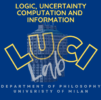In life and social sciences there are different interpretations and understandings of scientific evidence, and what can be inferred from the same experiment can be contradictory.
The consequences of such disagreement are detrimental to science and, ultimately, to public trust in science itself.
Logical methods can help formalizing the methodology of data-driven inference, e.g. statistical inference and ML. By introducing criteria of logical validity for scientific inference to clarify which inferences we should consider justified. In doing so, this research will make a central contribution to the methodology of data-driven science (and thus AI) and will help to consolidate public trust in the scientific method.
Data-Driven Science
- Uncertainty in the data
- Possible contradictory outcomes
- Graded levels of support or rejection of a given hypothesis
Argumentation Theory
- Formalizes non-monotonic reasoning
- High expressive power
- We can have several levels of abstraction
- Logic can be used inside the arguments or to define the relations among existing arguments
- Easy to communicate
- Implementable
Logical Methods
- Classical Logic is not enough
- Non-monotonic Logic
- Many-valued Logic
Theoretical and Social Impact
By constructing -through argumentation theory- of a bridge between data-driven science, e.g. statistical methods and ML, and a family of non-classical logics we can:
- Advance the state of the art in the methodological foundations of probabilistic reasoning in conditions of great uncertainty.
- Produce software for support decision-making in situations of uncertainty.
- Make a contribution to the current debate on eXplainable AI.
- Work towards an increase of people’s understanding of scientific findings and ultimately increase people’s trust in science.
MEPER Research Center
How can probabilistic evidence be constructed when data are gappy, scarce and unreliable?
To tackle this question the ReDa project coordinates the Research Center on “Methodological foundations of the construction of Probabilistic Evidence in Rare Cancer” (MePeR) in collaboration with Istituto Nazionale Tumori in Milan and the Department of Oncology and Ematology-Oncology (DIPO) at the University of Milan.

